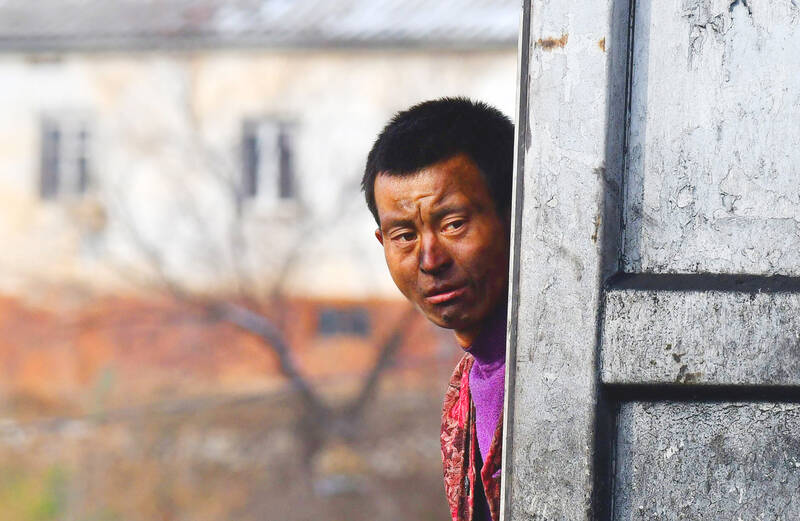Hundreds of meters underground, Emylbek Umarov hacked out lumps of coal by hand with a pickaxe in a dank mine in a remote mountainous corner of Kyrgyzstan.
Coal might be falling out of favor elsewhere because of climate change, but Suluktu’s mines hope growing demand from neighboring Central Asian countries and beyond would help them return to their Soviet heyday.
For some, like Umarov, the mine is one of the few places offering work — despite the threat of accidents that have killed dozens of people in the area in the past few years.

Photo: AFP
“It’s terrifying, it’s tough, but there’s no other work here,” said the 27-year-old, who has two degrees in computing and economics.
As he spoke, the coughing of miners with blackened faces echoed through the tunnels illuminated by a few lamps hanging from a ceiling dripping with water.
The men work with jackhammers, pickaxes and explosives on 12-hour shifts day or night 15 days a month for a monthly salary of less than 150 euros (US$159).

Photo: AFP
Before starting their shifts, they have to travel an hour to the mine in large Russian-made Kamaz trucks along a badly rutted road.
The hulks of Soviet-era machinery could be seen in the pinkish dawn.
Tucked away in the mountains, the town of Suluktu was founded in 1868 and is one of the oldest coal extraction hubs in Central Asia.

Photo: AFP
From the “miner’s bread” on sale in local bakeries to the local soccer team called “Shakhtar” (Miner) — everything in the town is a reminder of its main industry, including the coal dust coating the ground.
The town “heated Central Asia during Soviet times,” Suluktu Mayor Maksat Kadyrkulov said.
Like settlements across the former Soviet Union, it suffered from deindustrialization after its collapse, leading to a sharp drop in population and coal output.
“There is no farmland here. We just dig coal and there is no family without a miner,” Kadyrkulov said.
The mayor said he hoped Suluktu would recover its “past glory” thanks to growing demand for coal.
The Soviet era is a constant presence in the town.
On its outskirts stands a monument depicting two miners with a 4m-high hammer and sickle.
Trucks filled with coal file past the statues on their way to deliver their cargo to Uzbekistan and beyond since access to nearby Tajikistan is now closed off because of a flare-up of tensions along the border.
A mosaic nearby extols the glory of Soviet power, showing a miner with a red star behind him.
Before “we were proud to be miners,” said 64-year-old Nimadjan Abdulayevich, who spent 37 years in the mines, his voice hoarse from throat cancer.
While there have been no fatal accidents in the mine where Umarov works, the risk is constant.
“The mine is like a second front. You risk dying there,” is a phrase that miners often repeat.
Last year, the metal bars holding up the vein where Umarov was working collapsed, breaking his leg.
“Since then, the fear remains,” he said.
His father Dzhumbai, who now works on the surface as a welder, was caught up in a similar accident.
Mine director Kanynbek Ismailov said he lacked the resources for new equipment, even though the conditions in the mine are among the best of the 40 or so in Suluktu.
“We do everything by hand. We do not have new equipment,” Ismailov said.

Vincent Wei led fellow Singaporean farmers around an empty Malaysian plot, laying out plans for a greenhouse and rows of leafy vegetables. What he pitched was not just space for crops, but a lifeline for growers struggling to make ends meet in a city-state with high prices and little vacant land. The future agriculture hub is part of a joint special economic zone launched last year by the two neighbors, expected to cost US$123 million and produce 10,000 tonnes of fresh produce annually. It is attracting Singaporean farmers with promises of cheaper land, labor and energy just over the border.

US actor Matthew McConaughey has filed recordings of his image and voice with US patent authorities to protect them from unauthorized usage by artificial intelligence (AI) platforms, a representative said earlier this week. Several video clips and audio recordings were registered by the commercial arm of the Just Keep Livin’ Foundation, a non-profit created by the Oscar-winning actor and his wife, Camila, according to the US Patent and Trademark Office database. Many artists are increasingly concerned about the uncontrolled use of their image via generative AI since the rollout of ChatGPT and other AI-powered tools. Several US states have adopted

A proposed billionaires’ tax in California has ignited a political uproar in Silicon Valley, with tech titans threatening to leave the state while California Governor Gavin Newsom of the Democratic Party maneuvers to defeat a levy that he fears would lead to an exodus of wealth. A technology mecca, California has more billionaires than any other US state — a few hundred, by some estimates. About half its personal income tax revenue, a financial backbone in the nearly US$350 billion budget, comes from the top 1 percent of earners. A large healthcare union is attempting to place a proposal before

KEEPING UP: The acquisition of a cleanroom in Taiwan would enable Micron to increase production in a market where demand continues to outpace supply, a Micron official said Micron Technology Inc has signed a letter of intent to buy a fabrication site in Taiwan from Powerchip Semiconductor Manufacturing Corp (力積電) for US$1.8 billion to expand its production of memory chips. Micron would take control of the P5 site in Miaoli County’s Tongluo Township (銅鑼) and plans to ramp up DRAM production in phases after the transaction closes in the second quarter, the company said in a statement on Saturday. The acquisition includes an existing 12 inch fab cleanroom of 27,871m2 and would further position Micron to address growing global demand for memory solutions, the company said. Micron expects the transaction to